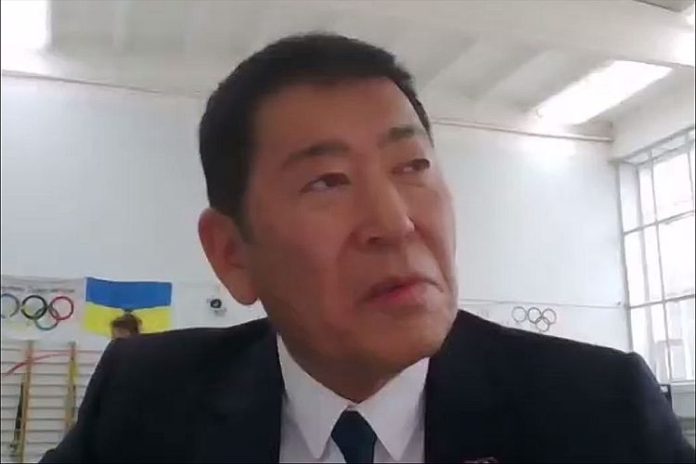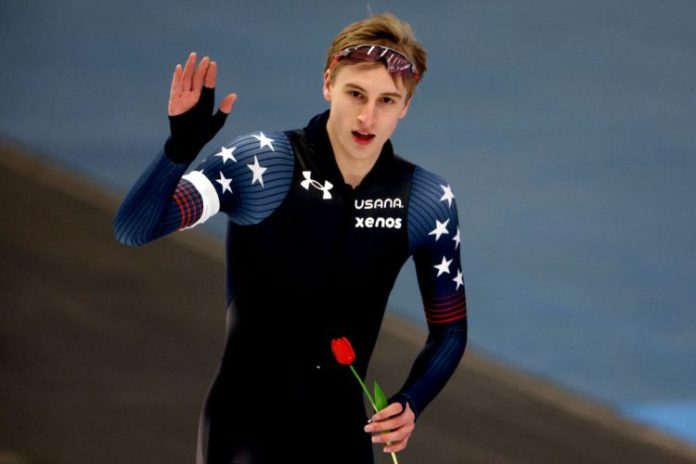★ The Sports Examiner: Chronicling the key competitive, economic and political forces shaping elite sport and the Olympic Movement.★
★ To get the daily Sports Examiner Recap by e-mail: sign up here! ★
≡ IOC PRESIDENTIAL ELECTION ≡
The image was dramatic, as International Gymnastics Federation (FIG) president Morinari Watanabe (JPN) came on-screen for his hour-long interview session, discussing his campaign to be the next President of the International Olympic Committee in a forum arranged by the International Sports Journalists Association (AIPS).
Watanabe was speaking from a rhythmic gymnastics practice session in Ukraine!
Perhaps half a dozen girls were practicing with the Ribbon, in a gym adorned with the Ukrainian flag and the Olympic rings, and Watanabe confirmed that he was in Kyiv, having traveled from Frankfurt (GER) and the European Olympic Committees General Assembly that finished on Saturday. He explained:
“Why I am in Kyiv, Ukraine? We knew the result of the [Friday] meeting between President Trump and President Zelenskyy. I don’t know what everyone thought, but I became very worried about the Ukraine gymnasts. Because I always say that I am the father of gymnastics, and my gymnasts are my sons, and my daughters.
“People are worried about their future by the current situation. I think people should be here for people during difficult times. So that’s why I changed my schedule and I am here.”
Asked about the view of what he has seen in Kyiv, and the people he has talked to, he added:
“They are very worried, especially after the meeting with President Zelenskyy and Trump, but they like gymnastics. They like sports, they are continuing with the sports. That’s why we must support [them]. I was thinking, we must contribute for the peace, by sports. And my feeling [on this] is now more stronger.”
This follows Watanabe’s consistent pattern of showing support for those in difficulty. In January, as the firestorms raged in the Los Angeles area, the FIG was the only International Federation to post a message of support for Los Angeles, the site of the 2028 Olympic and Paralympic Games.
He was asked about his radical idea to change the Olympic Games to a 24-hours-a-day event, held concurrently on five continents, with 10 sports – 50 total – held in each of five host cities or regions.
His idea is to share the impact of the Games simultaneously in all areas:
● “Paris 2024 was a historic success. However, I believe we should not be satisfied and that we must build on the success of these Games.”
● “[I]n contrast to the spectacular Olympic Games, the situation of the [National Olympic Committees] is far from strong. Economically, these countries are not [supportive]. In many countries, [the NOC’s] relationship with the government are not good. Olympians have no guarantee of a career once they retire. In addition, the way people look at the Olympic Games is not always welcome.”
● “The purpose of the Olympic Games is for as many people as possible to understand Olympism. And to contribute to the development of sports and peace. So, if we will organize this five-continent Olympic Games, we will get many benefits.”
● “For the athlete, each sport will take place in one of the five countries that offers the best climate and facilities for that sport. For the host countries, each country will host 10 sports, greatly reducing the financial burden.”
● “For marketing and the TV rights, there will be 24 hours coverage and more sponsorship potential. And new sources of continental sponsorship.”
As for prize money and the Olympic Games. Watanabe’s response was simple: no. He added:
“I do not agree that the IOC pay for the prize money. Because, I have visited 162 countries; you know, every country is different environment, situation, especially for the developing countries.
“They don’t have facilities, they don’t have a training system; we must support those developing countries. IOC should provide support to developing countries.”
He was further clear that as for the future of trans athletes, that human rights are important and that decisions must be taken on the basis of medical evidence.
Watanabe was also asked about fairness in judging and the manipulation of results. He’s all for a technological solution:
“In judging sports, we must be more fair. In reality, we have a problem, not just in gymnastics, and in many other sports. That’s why I started [pushing] for the AI judging system. We need technology, so I think we will see – in this year – in the world championships in gymnastics in Jakarta [INA], we can see with the judging – AI – how is judging in that [way].
“We need more transparent [judging], we need more, better judging.”
He sees gymnastics in the vanguard of the change to technology in judging. A follow-up question asked if removing people as judges in the future removes a “human” element in sport, and Watanabe pointed to other sports which are timed or measured:
“I want gymnastics to be like track & field, and sailing; no ‘human touch.’ It’s only calculated by AI, computer.”
He noted that people all have different views, as in art, which are informed by their own culture, which is necessarily regional, local and personal. But the judging in sports has to be universal, according to the criteria in the rules and should not be subject to the influences of people’s backgrounds and beliefs. Here is where technology can play an important, neutral role.
Observed: In a free-flowing conversation, Watanabe’s warmth and caring personal qualities come forward and make him a more attractive candidate than in his radical manifesto.
He is, nevertheless, a free-thinking futurist and his vision as expressed makes him almost sure to be the first candidate to be eliminated in the IOC Presidential vote on 20 March.
But as with other visionaries, do not be surprised if some of his ideas creep into the IOC’s thinking in the years to come, notably on the use of artificial intelligence and more direct development funding in countries which need facilities to encourage the development of sport.
And, in terms of supporting athletes, would any other candidate dare to go to Ukraine and do a live forum in a war zone?
¶
★ Receive our exclusive, weekday TSX Recap by e-mail by clicking here.
★ Sign up a friend to receive the TSX Recap by clicking here.
★ Please consider a donation here to keep this site going.
For our updated, 895-event International Sports Calendar for 2025 and beyond, by date and by sport, click here!

























